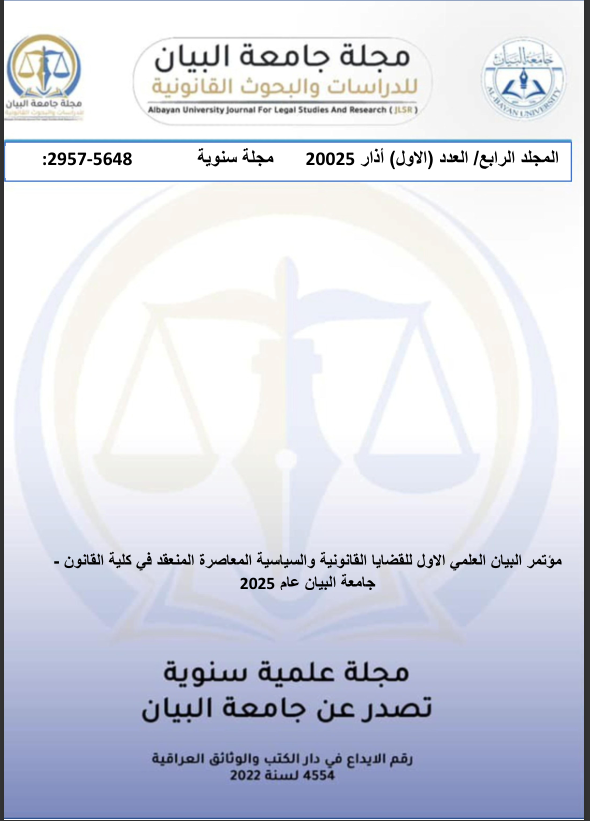Transparency and Freedom of Information in Administrative Work - A Comparative Study
DOI:
https://doi.org/10.65263/11x6k214Keywords:
Administration, Information, Transparency, Law, FreedomAbstract
Combating administrative corruption is achieved by subjecting the activities and work of the administration to transparency, as this principle constitutes a fertile environment for administrative and political reform, which is positively reflected in all developmental and humanitarian fields.
The administration's reliance on the principle of transparency in its work contributes to raising the rates of development and progress in various fields, and it also has a major role in achieving administrative reform and preventing administrative corruption, and that adopting it requires the state to adopt effective legal rules to access information and participate in the management of public affairs, and it is a right of citizens towards the state, and a duty of the administration towards them.
The research problem arises in defining the meaning of transparency in the work of the administration and its most important applications, and accordingly we will divide this study into two requirements that examine the meaning of transparency and its basis, and its most important applications in the work of the administration and the exceptions to it, by adopting the analytical and comparative scientific research method.
References
First: Books:
1. Dr. Osama Abu Al-Hassan Mujahid: Civil Protection of the Presumption of Innocence, Dar Al-Nahda Al-Arabiya, Egypt, 2006.
2. Sami Al-Tawkhi: The Legal System of Government Under the Sunlight (A Comparative Study), Dar Al-Nahda Al-Arabiya, Cairo, 2014.
Second: Theses and Dissertations:
1. Faris bin Aloush bin Badi: The Role of Transparency and Accountability in Reducing Administrative Corruption in Government Sectors, PhD thesis submitted to Naif Arab University for Security Sciences, College of Graduate Studies/Department of Administrative Sciences, 2010.
2. Muhammad Rafi Mufleh: The Impact of Transparency on Reducing Administrative Corruption in the Jordanian Government Sector, Master's thesis submitted to Al-Ayyat University, College of Business and Finance, 2017.
Third: Published Research:
1. Dr. Saleh Abdul Ayed Al-Ajili and Dr. Nazer Ahmed Al-Mandil: The Role of Administrative Transparency in Reducing Administrative Corruption, a study published in the Journal of Legal Sciences, College of Law, University of Baghdad, Special Issue on Public Law Conference Research, 2018.
2. Dr. Omar Nihad Atta: Transparency in Concluding Administrative Contracts in Iraq (Self-Monitoring), a study published in the Journal of Imam Al-A'zam College, Volume 37, Al-Hikma University College, Baghdad.
3. Muhammad Qadri Hassan Abdul Rahman: Administrative Transparency, a study published in the Journal of Police Thought, Volume 23, Issue 90, 2014.
4. Wahiba Balbaqi and Madiha Al-Fahla: The Principle of Transparency in the Management of Public Affairs, a study published in the Journal of Rights and Freedoms, Volume 10, Issue 1, 2022.
Fourth: Constitutions and Laws
1. The Constitution of the Republic of Iraq of 2005.
2. The Iraqi Penal Code No. 111 of 1969, as amended.
3- Evidence Law No. 107 of 1979.
3- Income Tax Law No. 113 of 1982, as amended.
4- State and Public Sector Employees Discipline Law No. 14 of 1991, as amended.
Downloads
Published
Issue
Section
License
The authors retain Full copyright of their published article
Al-Bayan University Journal for Legal Studies and Research (AUJLSR) applies the Creative Commons Attribution 4.0 International (CC BY 4.0) License to articles and other works we publish. If you submit your paper for publication by AUJLSR, you agree to have the CC BY 4.0 license applied to your work.
Articles can be read and shared for under the following conditions:
BY: Attribution must be given to the original source (Attribution)
Full details available at
https://creativecommons.org/licenses/by/4.0/



